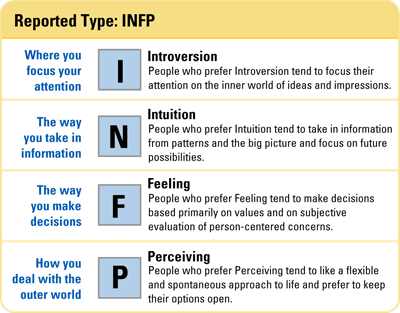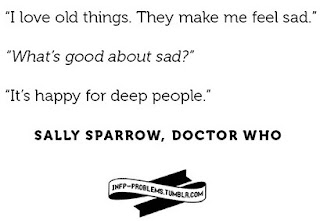do you know what personality type you are? finding out may liberate you, as it did for me.
i have always wondered (and often hated) why i am so odd/unusual/freakish, and why i have needs and habits i cannot shake, such as the need to spend a lot of time alone, or why i am often disorganized and unmotivated. why do i feel so incredibly passionate about certain things, like raising awareness about the horrors of meat industry, and for fellow believers to really "get" and experience the love God has for them, and the freedom that is found in His love!
so, i took many different versions of the Myers-Briggs Type Indicator tests that are available on-line, and my results kept coming up INFP. but before i get into that, here are the 16 different personality types, and four different categories those types fit into, according to Myers-Briggs:
after reading about my type, it was as if God was saying to me,"You are the way you are, because I made you that way!" which was very reassuring. of course, not all of the attributes of an INFP apply to me (like being shy or reserved), but the majority of them do.
here's a breakdown of the letters INFP:
here's a summary of an INFP:
INFP is rare personality type, making up about 4 % of the population.
INFPs are the flower children of the personality types. They never lose their sense of wonder. As children INFPs will live in both the fantasy and the real world, switching back and forth effortlessly. Their imaginations are vast and they are the children whose toys come to life and who have imaginary friends. Some INFPs claim that everything has a "soul", animals and humans alike. (Yep, that's me!)
INFPs, more than other iNtuitive Feeling types, are focused on making the world a better place.
INFPs are passionate about their values, and find meaning in supporting the personal development of others. They easily recognize the possibilities for growth in themselves and others, and often have a vision for how to heal the world around them. INFPs often feel dejected because of the numerous bad things happening in the world and try hard to create something positive within it.
An INFP views their conflicts as being on a grander scale relating to all situations – not simply in the moment, but looking at all of life as Good vs. Evil. INFPs believe that good always triumphs over evil and will want to spread this message to anyone who will listen.
INFPs always have a sense of other-worldliness about them and are often caught day-dreaming.
Many writers and poets are INFPs, as they may be awkward and uncomfortable with expressing themselves verbally, but have a wonderful ability to define and express what they're feeling on paper.
INFPs have a strong sense of metaphor. They may ascribe human characteristics to animals or inanimate objects. For example, they may see a fly sitting on the glass and wonder what it is thinking, then come up with a meaningful story about how it feels to be separated from everything you desire by an invisible wall.
INFPs feel restricted by rules and structure and have a hard time performing job tasks that do not connect to their values. INFPs do not like to deal with hard facts and logic. Their focus on their
feelings and the Human Condition makes it difficult for them to deal with
impersonal judgment. The INFP is not particularly driven by money or status, preferring work that aligns with their personal values and allows them to help others.
Although they view the world in a joyous manner, INFPs are not exempt from feeling down at times; they struggle to maintain ethical perfection and will feel as if they failed when they are being anything less than "perfect" in the humanitarian sense. Of all types, INFPs are most likely to report suicidal thoughts.
There is a crusading side to the INFP. When personal values or beliefs are trodden on, the INFP can become outspoken and turn on the transgressor. The INFP becomes like a champion of the causes they hold dear, and will be expressive, animated and at times go for the jugular.
INFPs do not like to be categorised. They value their autonomy, and feel "different", and like that.
INFPs have deep emotions which are often hidden until a circumstance reveals them. Their abstract thinking, related to the prefrontal cortex, suggests that INFPs have deeper emotions then most.
Highly creative, artistic and spiritual, INFPs can produce wonderful works of art, music and literature. INFPs find great satisfaction if they develop their artistic abilities. That doesn't mean that an INFP has to be a famous writer or painter in order to be content. Simply the act of "creating" will be a fulfilling source of renewal and refreshment to the INFP.
^ this is me back in the 90's!
Some famous INFP's are C.S. Lewis, J.R.R. Tolkien, Sylvia Plath, Virginia Woolf, Edgar Allan Poe, Shakespeare, John Lennon, Kurt Cobain, J.K. Rowling, Tim Burton, Florence Welch, Thom Yorke and Morrissey.
if you are interested in finding out what personality type you are, go here:
or for a shorter version:















